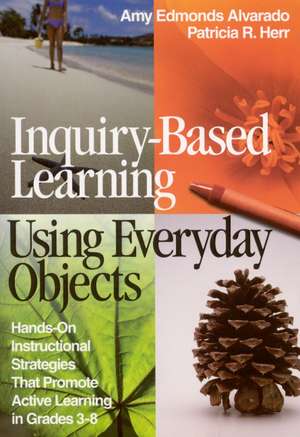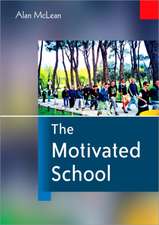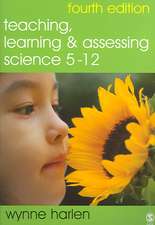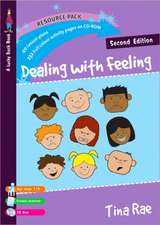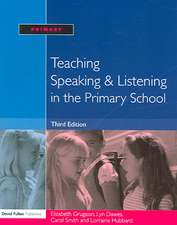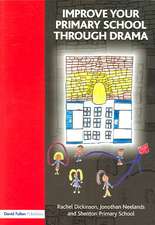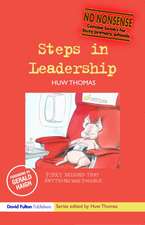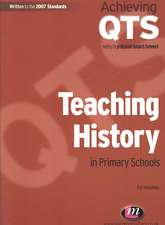Inquiry-Based Learning Using Everyday Objects: Hands-On Instructional Strategies That Promote Active Learning in Grades 3-8
Autor Amy Edmonds Alvarado, Patricia R. Herren Limba Engleză Paperback – 9 iun 2003
Preț: 276.86 lei
Nou
Puncte Express: 415
Preț estimativ în valută:
52.98€ • 55.46$ • 43.83£
52.98€ • 55.46$ • 43.83£
Carte disponibilă
Livrare economică 17-31 martie
Livrare express 28 februarie-06 martie pentru 27.33 lei
Preluare comenzi: 021 569.72.76
Specificații
ISBN-13: 9780761946809
ISBN-10: 0761946802
Pagini: 216
Dimensiuni: 178 x 254 x 13 mm
Greutate: 0.4 kg
Ediția:New.
Editura: SAGE Publications
Colecția Corwin
Locul publicării:Thousand Oaks, United States
ISBN-10: 0761946802
Pagini: 216
Dimensiuni: 178 x 254 x 13 mm
Greutate: 0.4 kg
Ediția:New.
Editura: SAGE Publications
Colecția Corwin
Locul publicării:Thousand Oaks, United States
Cuprins
Acknowledgments
About the Authors
Dedication
Introduction: Welcome to Inquiry-Based Learning Using Everyday Objects (Object-Based Inquiry)
Part I. Object-Based Learning
1. What Is Object-Based Inquiry?
The Reality of Object-Based Learning
Why Use Object-Based Inquiry?
Time to Begin Your Journey
2. How Do I Gather Collections?
Getting Started
Expanding Your Collection
Storing Your Collections
3. How Do I Get Started?
Planning the Classroom
Grouping Your Students
Planning Your Lessons
Avoiding the Pitfalls
Benefits
Roles of the Teacher and Students
4. Where Do I Start With Planning?
Things to Consider
Step One: Developing Essential Understandings
Step Two: Identifying Specific Objectives
Step Three: Locating the Objects
Step Four: Question Development
Conclusion
5. How Do I Assess?
Formative Assessment
Summative Assessment
Part II. Lesson Plans
6. Language Lesson Plans
Why Do Tigers Have Stripes?
What Makes a Poem Perfect?
She Sells Sea Shells
What's Your Fantasy?
7. Science Lesson Plans
Zone Home
Birds of a Feather
Whose Track Is That?
Science Rocks
8. Social Studies Lesson Plans
I'm a Mystery: What's My History
Can You Dig History?
Where in America Are You?
Flower Power
9. Math Lesson Plans
Measuring Madness
Architectural Geometry
What's For Dinner?
What Part of Fractions Is Difficult?
Glossary
Index
About the Authors
Dedication
Introduction: Welcome to Inquiry-Based Learning Using Everyday Objects (Object-Based Inquiry)
Part I. Object-Based Learning
1. What Is Object-Based Inquiry?
The Reality of Object-Based Learning
Why Use Object-Based Inquiry?
Time to Begin Your Journey
2. How Do I Gather Collections?
Getting Started
Expanding Your Collection
Storing Your Collections
3. How Do I Get Started?
Planning the Classroom
Grouping Your Students
Planning Your Lessons
Avoiding the Pitfalls
Benefits
Roles of the Teacher and Students
4. Where Do I Start With Planning?
Things to Consider
Step One: Developing Essential Understandings
Step Two: Identifying Specific Objectives
Step Three: Locating the Objects
Step Four: Question Development
Conclusion
5. How Do I Assess?
Formative Assessment
Summative Assessment
Part II. Lesson Plans
6. Language Lesson Plans
Why Do Tigers Have Stripes?
What Makes a Poem Perfect?
She Sells Sea Shells
What's Your Fantasy?
7. Science Lesson Plans
Zone Home
Birds of a Feather
Whose Track Is That?
Science Rocks
8. Social Studies Lesson Plans
I'm a Mystery: What's My History
Can You Dig History?
Where in America Are You?
Flower Power
9. Math Lesson Plans
Measuring Madness
Architectural Geometry
What's For Dinner?
What Part of Fractions Is Difficult?
Glossary
Index
Notă biografică
Amy Alvarado has thirteen years experience in the classroom and extensive expertise in helping educators improve instructional techniques and curriculum design in all content areas. She has an undergraduate degree in English and secondary education from the College of William and Mary and a masters degree in Educational Psychology with a specialization in gifted education from the University of Virginia. She is currently a doctoral candidate in Curriculum and Instruction at the University of Virginia.
Descriere
This exciting new book explores how students can use everyday objects to answer essential questions, meet curriculum standards, and grow in observation, inquisitiveness, and reflective learning.
